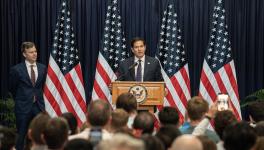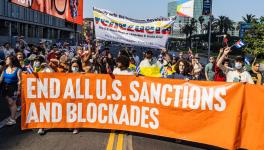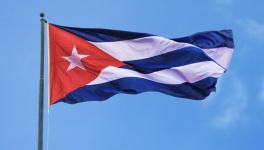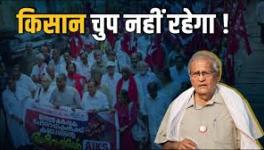Fidel Castro’s Economics of National Liberation

Fidel Castro visiting agricultural production in Cuba. Photo: Granma
August 13, 2025 marked what would have been the 99th birthday of Cuban revolutionary Fidel Castro. It also marks the beginning of year-long celebrations for his centenary. Castro is known as many things: a hardened revolutionary, charismatic orator, skilled diplomat, and moral compass of the Third World project.
But Castro was also a Marxist theoretician steeped in the practical struggle of revolution and socialist construction. He assumed leadership of a plantation economy that was the product of 400 years of colonization, while facing unprecedented external constraints in the form of an over six-decade-long economic embargo by the United States. This meant that Castro probably had to think about economics and development more than most leaders. It was a fundamental question for Cuba’s survival.
In the current conjuncture, where heightened protectionism, militarism, and unilateralism from the Global North threaten the prospects for peace and development for the global majority, it is worth revisiting some elements of Castro’s economic thought.
Industrialization cannot wait forever
In October 1953, following the heroic assault on the Moncada Barracks, Castro was arrested and brought to trial, where he delivered his iconic speech, “History Will Absolve Me”. This speech provides some early insights into Castro’s frustration with Cuba’s underdevelopment, his analysis of its root causes, and his desire to trigger a social transformation:
“Except for a few food, lumber and textile industries, Cuba continues to be primarily a producer of raw materials. We export sugar to import candy, we export hides to import shoes, we export iron to import ploughs … Everyone agrees with the urgent need to industrialize the nation, that we need steel industries, paper and chemical industries, that we must improve our cattle and grain production, the technology and processing in our food industry in order to defend ourselves against the ruinous competition from Europe in cheese products, condensed milk, liquors and edible oils, and the United States in canned goods; that we need cargo ships; that tourism should be an enormous source of revenue. But the capitalists insist that the workers remain under the yoke. The state sits back with its arms crossed and industrialization can wait forever”.
A few key points can be gleaned from this passage. First, Castro’s awareness of the international division of labor that had relegated Cuba to a producer of raw materials. Second, his understanding of the need for both heavy industrialization and agricultural modernization to develop the country. Third, that the local capitalist class, contrary to classical analysis, preferred to hold back the development of the productive forces in order to prevent further development of the working class. Fourth, that the existing state structures and the domestic class interests that governed it were fetters to the development of the country.
This short passage demonstrates that the then twenty-seven-year-old Castro already had a razor-sharp understanding of the problems of underdevelopment. Perhaps he had read Raul Prebisch’s classic text on underdevelopment, “Economic Development of Latin America and its Principal Problems”, which was published three years earlier in 1950. Or perhaps he came to this analysis through his own experiences in revolution and in discussion with his comrades.
From Cuban liberation to Global South emancipation
Castro may have started his revolutionary career as a voice for Cuban liberation, but as his international stature grew, he soon became an icon for the emancipation of the entire Global South. In 1983, at the Seventh Summit of the Conference of Non-Aligned Countries in New Delhi, Castro presented a book-length report titled “The World Economic and Social Crisis: Its Impact on the Underdeveloped Countries, Its Somber Prospects, and the Need to Struggle if We Are to Survive”. Though printed under Castro’s name, the report’s introduction acknowledges that it was a collective effort: a product of cooperation between economists from Cuba’s World Economic Research Center and the International Economic Research Center of the University of Havana’s School of Economics.
The report argued that the crises of 1979–1982 originated in a crisis of overproduction in the industrialized countries. The monetarist response to this (namely, the heightening of interest rates) helped externalize the crisis and transmit it to the unindustrialized countries, causing currency depreciation, widening trade deficits, high inflation, poverty and a general widening of the gap between the industrialized and unindustrialized countries. Castro’s analysis was not a linear explanation of the crisis but a conjunctural analysis, taking into account a range of factors including the arms race and the food and energy crises.
The report ends with an exhaustive agenda for action, emphasizing the need for unity within the Global South, while also making the case that a solution for the Global North’s own crises would be to end the exploitation of the South:
“The economic backwardness, lack of financial means, severe contraction of foreign trade, hunger, unemployment and absence of even the most basic living conditions in the Third World cannot, in the long run, be beneficial to any of the developed capitalist countries. To the contrary, the positive outcome of our situation would have a favorable influence on the upsurge in world trade and would alleviate the unemployment, under-utilization of installed capacities and stagnation of their economies. It is an obvious truth that, if our economies expanded, this would help reduce the tense crisis situation that has been generated in those countries. The continuation of the exploitation that is ruining the Third World would inexorably end in ruin for all.”
Those last three words, “ruin for all”, echo Karl Marx and Friedrich Engels’ warning in the Communist Manifesto that class struggles can culminate “either in a revolutionary reconstitution of society at large or in the common ruin of the contending classes”. Castro takes this prognosis and adapts it to the age of imperialism. He was for the revolutionary reconstitution of society.
Nearly two decades later, Castro cut a lonely figure at the UN Millennium Summit in Geneva. This was Castro’s last speech at the UN and one delivered during the peak of neoliberal globalization and the Washington Consensus. It was much shorter than his famous 1960 speech at the UN but no less significant. He began with a jab at the countries of the Global North, which “monopolize the economic, political and technological power” and “offer more of the same recipes that have only served to make us poorer, more exploited, and more dependent”. He concluded that “There is nothing in the existing economic and political order that can serve the interests of humankind”.
Towards an economics of national liberation
Economics has never been a value-neutral field of inquiry. Its formation into a distinct academic field is a result of the birth of capitalism. Economics as we know it has historically had to provide ideological cover for at least three distinct class struggles: first, the struggle between landed feudal interests and the emerging industrial capitalists; second, the struggle between the capitalists and workers; and third, the struggle between industrialized nations and the colonized and imperialized nations. These struggles have defined the morality (or lack thereof) of the field of economics.
Castro’s economics was an economics of national liberation. It valued the sovereignty of nations and the dignity of its peoples. Like all economic models, it can be said to contain a few assumptions: There is an external constraint – the international division of labor enforced by multinational corporations and the existing international financial institutes. Additionally, any attempt to overcome this constraint leads to violence – coups, assassinations, sanctions, and embargoes. And finally, the majority of people in the Global South, and indeed across the world, have a common interest in uniting to put an end to this system of exploitation and the polarization and crises that it begets.
In his last speech, delivered in 2017 at the 7th Congress of the Communist Party of Cuba, Castro said that “the ideas of the Cuban communists will remain as proof that on this planet, if we work with fervor and dignity, the material and cultural goods that human beings need can be produced”.
It is an interesting turn of phrase that ideas can produce the goods human beings need.
According to the Oxfam report “Takers not Makers”, the number of people living in poverty has barely changed since 1990. In the last ten years, the wealth of the top one percent of the world’s population has grown by over $33.9 trillion – enough to end poverty twenty-two times over. Perhaps it is time for new ideas.
Shiran Illanperuma is a Sri Lankan journalist and political economist. He is a researcher at Tricontinental: Institute for Social Research and a co-editor of Wenhua Zongheng: A Journal of Contemporary Chinese Thought.
This article was produced by Globetrotter.
Courtesy: Peoples Dispatch
Get the latest reports & analysis with people's perspective on Protests, movements & deep analytical videos, discussions of the current affairs in your Telegram app. Subscribe to NewsClick's Telegram channel & get Real-Time updates on stories, as they get published on our website.
























